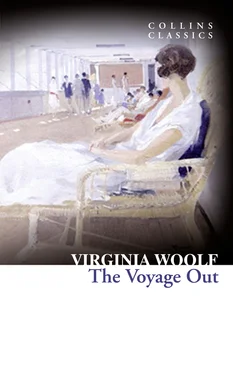“They’re old friends,” said Helen, smiling at the sight. “Now, is there a room for us to sit in?”
Rachel opened a door.
“It’s more like a landing than a room,” she said. Indeed it had nothing of the shut stationary character of a room on shore. A table was rooted in the middle, and seats were stuck to the sides. Happily the tropical suns had bleached the tapestries to a faded blue-green colour, and the mirror with its frame of shells, the work of the steward’s love, when the time hung heavy in the southern seas, was quaint rather than ugly. Twisted shells with red lips like unicorn’s horns ornamented the mantelpiece, which was draped by a pall of purple plush from which depended a certain number of balls. Two windows opened on to the deck, and the light beating through them when the ship was roasted on the Amazons had turned the prints on the opposite wall to a faint yellow colour, so that “The Coliseum” was scarcely to be distinguished from Queen Alexandra playing with her Spaniels. A pair of wicker arm-chairs by the fireside invited one to warm one’s hands at a grate full of gilt shavings; a great lamp swung above the table—the kind of lamp which makes the light of civilisation across dark fields to one walking in the country.
“It’s odd that every one should be an old friend of Mr. Pepper’s,” Rachel started nervously, for the situation was difficult, the room cold, and Helen curiously silent.
“I suppose you take him for granted?” said her aunt.
“He’s like this,” said Rachel, lighting on a fossilised fish in a basin, and displaying it.
“I expect you’re too severe,” Helen remarked.
Rachel immediately tried to qualify what she had said against her belief.
“I don’t really know him,” she said, and took refuge in facts, believing that elderly people really like them better than feelings. She produced what she knew of William Pepper. She told Helen that he always called on Sundays when they were at home; he knew about a great many things—about mathematics, history, Greek, zoology, economics, and the Icelandic Sagas. He had turned Persian poetry into English prose, and English prose into Greek iambics; he was an authority upon coins; and—one other thing—oh yes, she thought it was vehicular traffic.
He was here either to get things out of the sea, or to write upon the probable course of Odysseus, for Greek after all was his hobby.
“I’ve got all his pamphlets,” she said. “Little pamphlets. Little yellow books.” It did not appear that she had read them.
“Has he ever been in love?” asked Helen, who had chosen a seat.
This was unexpectedly to the point.
“His heart’s a piece of old shoe leather,” Rachel declared, dropping the fish. But when questioned she had to own that she had never asked him.
“I shall ask him,” said Helen.
“The last time I saw you, you were buying a piano,” she continued. “Do you remember—the piano, the room in the attic, and the great plants with the prickles?”
“Yes, and my aunts said the piano would come through the floor, but at their age one wouldn’t mind being killed in the night?” she enquired.
“I heard from Aunt Bessie not long ago,” Helen stated. “She is afraid that you will spoil your arms if you insist upon so much practising.”
“The muscles of the forearm—and then one won’t marry?”
“She didn’t put it quite like that,” replied Mrs. Ambrose.
“Oh, no—of course she wouldn’t,” said Rachel with a sigh.
Helen looked at her. Her face was weak rather than decided, saved from insipidity by the large enquiring eyes; denied beauty, now that she was sheltered indoors, by the lack of colour and definite outline. Moreover, a hesitation in speaking, or rather a tendency to use the wrong words, made her seem more than normally incompetent for her years. Mrs. Ambrose, who had been speaking much at random, now reflected that she certainly did not look forward to the intimacy of three or four weeks on board ship which was threatened. Women of her own age usually boring her, she supposed that girls would be worse. She glanced at Rachel again. Yes! how clear it was that she would be vacillating, emotional, and when you said something to her it would make no more lasting impression than the stroke of a stick upon water. There was nothing to take hold of in girls—nothing hard, permanent, satisfactory. Did Willoughby say three weeks, or did he say four? She tried to remember.
At this point, however, the door opened and a tall burly man entered the room, came forward and shook Helen’s hand with an emotional kind of heartiness, Willoughby himself, Rachel’s father, Helen’s brother-in-law. As a great deal of flesh would have been needed to make a fat man of him, his frame being so large, he was not fat; his face was a large framework too, looking, by the smallness of the features and the glow in the hollow of the cheek, more fitted to withstand assaults of the weather than to express sentiments and emotions, or to respond to them in others.
“It is a great pleasure that you have come,” he said, “for both of us.”
Rachel murmured in obedience to her father’s glance.
“We’ll do our best to make you comfortable. And Ridley. We think it an honour to have charge of him. Pepper’ll have some one to contradict him—which I daren’t do. You find this child grown, don’t you? A young woman, eh?”
Still holding Helen’s hand he drew his arm round Rachel’s shoulder, thus making them come uncomfortably close, but Helen forbore to look.
“You think she does us credit?” he asked.
“Oh yes,” said Helen.
“Because we expect great things of her,” he continued, squeezing his daughter’s arm and releasing her. “But about you now.” They sat down side by side on the little sofa. “Did you leave the children well? They’ll be ready for school, I suppose. Do they take after you or Ambrose? They’ve got good heads on their shoulders, I’ll be bound?”
At this Helen immediately brightened more than she had yet done, and explained that her son was six and her daughter ten. Everybody said that her boy was like her and her girl like Ridley. As for brains, they were quick brats, she thought, and modestly she ventured on a little story about her son,—how left alone for a minute he had taken the pat of butter in his fingers, run across the room with it, and put it on the fire—merely for the fun of the thing, a feeling which she could understand.
“And you had to show the young rascal that these tricks wouldn’t do, eh?”
“A child of six? I don’t think they matter.”
“I’m an old-fashioned father.”
“Nonsense, Willoughby; Rachel knows better.”
Much as Willoughby would doubtless have liked his daughter to praise him she did not; her eyes were unreflecting as water, her fingers still toying with the fossilised fish, her mind absent. The elder people went on to speak of arrangements that could be made for Ridley’s comfort—a table placed where he couldn’t help looking at the sea, far from boilers, at the same time sheltered from the view of people passing. Unless he made this a holiday, when his books were all packed, he would have no holiday whatever; for out at Santa Marina Helen knew, by experience, that he would work all day; his boxes, she said, were packed with books.
“Leave it to me—leave it to me!” said Willoughby, obviously intending to do much more than she asked of him. But Ridley and Mr. Pepper were heard fumbling at the door.
“How are you, Vinrace?” said Ridley, extending a limp hand as he came in, as though the meeting were melancholy to both, but on the whole more so to him.
Willoughby preserved his heartiness, tempered by respect. For the moment nothing was said.
Читать дальше












